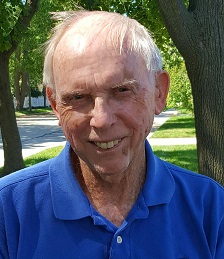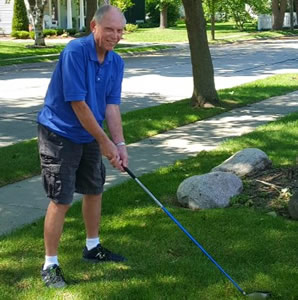Something to Cheer About

How an experimental immunotherapy helped one man overcome bladder cancer
Charles Albrecht was making the most of his active retirement, spending summers in Saginaw, Michigan, and winters in Florida to enjoy warm weather and golf courses year-round. His time in Florida also allowed him to cheer on his granddaughter's travel soccer team. But, three years ago, a diagnosis of bladder cancer came between him and his golf game.
His cancer led him to Ann Arbor and his own team of dedicated cheerleaders. Having surgery to remove his bladder, followed by two rounds of aggressive chemotherapy, took a significant physical and emotional toll on him. The treatment failed to wipe out his cancer.
"Sadly, too many bladder cancer patients have a similar experience," says Ajjai Alva, M.D., Albrecht's oncologist at the University of Michigan Rogel Cancer Center. "So when the standard chemotherapy drugs – which hadn't changed since the 1980s until very recently – aren't effective, we were left without viable second-line treatments to offer patients like Charles."
Alva brought a new immunotherapy clinical trial to Michigan. The study recruited 74 patients nationwide. Albrecht qualified and was the first of 13 to participate at U-M.
The promise of immunotherapy
Traditional chemotherapy does not discriminate well between cancer cells and normal cells. While it's busy attacking cancer cells, it's assaulting healthy cells, too. Immunotherapy jump starts the body's immune system, enlisting it to fight the cancer. As a result, patients generally endure fewer and less toxic side effects.
Everyone at Michigan did an excellent job but the team at the Ravitz Center was extra special. Every time I'm there for an infusion, they go out of their way to make me feel like part of their family. --Charles Albrecht
"The immunotherapy used in this Phase II study had already yielded good responses in melanoma, kidney and lung cancer patients," Alva explains, "and the data indicates that bladder cancer also tends to respond to immunomodulation (adjusting the immune system to a desired level). That's why we felt confident moving forward with this clinical trial."
Saying ‘yes’ to clinical research

For some patients and their families, the idea of receiving an experimental therapy as part of a research study is new and scary. For Albrecht, the choice was easy.
"Dr. Alva was upfront about my chances," he says. "If I hadn't chosen to participate in the trial, I might not be here. I'd tell any cancer patient to talk with their doctor about clinical trials – especially if what they’re doing now isn’t helping."
Courtney Oliver, a clinical research coordinator at the Cancer Center, was inspired by Albrecht's willingness to be part of the study. She scheduled Albrecht’s appointments and recorded his progress.
"For clinical research staff like me, the best part of the job is getting to know people like Charles and their families," she says. "For patients, participating in research means extra effort and attention is focused on them – there's a whole other team advocating for them and rooting for their success."
"It's like he's 10 years younger"
Albrecht travelled to Ann Arbor from Saginaw every three weeks for infusion. "As soon as the effects of the immunotherapy started kicking in, he made a U-turn," says Alva. "With each trip, he continued to improve by leaps and bounds."
"During his treatment, Charles and I developed a bit of a football rivalry," adds Oliver. "He’s loyal to the Lions, and I'm a Packers fan. I knew we were on the right track when we began scheduling his treatments around Lions games!"
--Amira Deep, N.P.
"When Charles' scans came back clear, I had the privilege of sharing the good news with him," says Amira Deep, N.P., an advanced practice nurse. "Many patients aren't sure how to react to positive news. Inside, we're jumping up and down, but they've gone through so much, it can take some time for it to sink in."
Albrecht’s health care team -- his cheerleaders -- are pleased with his remarkable turnaround, saying he seems 10 years younger. Now 81, he's back on the golf course and cheering on his granddaughter's soccer team once again.
"They tell me my tumors are gone as a result of the treatment,": says Albrecht, who is the first patient to complete the study at U-M. "And the only real side effect I've had is itching. That's nothing compared to the bad days I had before."
Read other cancer survivors' stories
